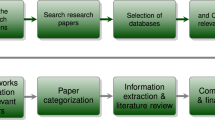Abstract
The growth of eCommerce is being hampered by a lack of trust between providers and consumers of Web-based services. While researchers in many disciplines have addressed Web trust issues, a comprehensive approach has yet to be established. This paper proposes a conceptual trust-profiling framework through a range of new user-centred trust measures. W3TF is a generic form of trust assessment that can help build user confidence in an eCommerce environment. It incorporates existing measures of trust (such as Public Key Infrastructure), takes account of consumer perceptions by identifying trust attributes, and uses Web technology (in the form of metadata), to create a practical, flexible and comprehensive approach to trust assessment.
Preview
Unable to display preview. Download preview PDF.
Similar content being viewed by others
References
Belanger, F., Sridhar, V., Van Slyke, C.: Comparing the Influence of Perceived Innovation Characteristics and Trustworthiness Across Countries. In: Proceeding of the International Conference on Electronic Commerce Research, ICECR-5 (November 2002)
Cheskin & Studio Archetype/Sapient, San Francisco, eCommerce Trust Study (January 1999), www.cheskin.com/think/studies/ecomtrust.html
iTrust, Aspects of Trust, The iTrust working group, cited 28 (October 2005), http://www.itrust.uoc.gr/dyncat.cfm?catid=37
Fogg, B., Marshall, J., Laraki, O., Osipovich, A., Varma, C., Fang, N., Paul, J., Rangnekar, A., Shon, J., Swani, P., Treinen, M.: What Makes Web Sites Credible? A Report on a Large Quantitative Study. In: Proceedings of the SIGCHI Conference on Human factors in Computing Systems, Seattle, USA, pp. 61–68 (2001) ISBN:1581133278
Fogg, B.J., Marshall, J., Karmeda, T., Solornon, J., Rangnekar, A., Boyd, J., Brown, B.: Web Credibility Research: a Method for Online Experiments and Early Study Results (2001), http://www.webcredibility.org/studies/WebCredFoggCHI2001shortpaper.PDF
Gorsch, D.: Internet Limitations, Product Types, and the Future of Electronic Retailing. In: Proceeding of the 1st Nordic Workshop on Electronic Commerce. Halmstad University: Viktoria Institute (May 2001)
Grandison, T., Sloman, M.: A Survey of Trust in Internet Applications. IEEE Communications Surveys and Tutorials 3(4) (Fourth Quarter 2000), www.comsoc.org/livepubs/surveys/public/2000/dec/grandison.html
Herzberg, A., Jbara, A.: Reestablishing Trus. In: the Web. Dr. Dobb’s Journal (October 2005)
Hoffman, D.L., Novak, T.P., Peralta, M.: Building Consumer Trust Online. Communications of ACM 42(4), 80–85 (1999) ISSN: 0001-0782
Head, M.M., Yuan, Y., Archer, N.: Building Trust in E-Commerce: A Theoretical Framework. In: Proceeding of the Second World Congress on the Management of Electronic Commerce. MCB Press (January 2001)
Jones, S.: TRUST-EC: Requirements for Trust and Confidence in E-Commerce. In: Workshop Requirements for trust and confidence in E-commerce, Luxembourg, CEC (1999)
Jøsang, A., Pedersen, I.G., Povey, D.: PKI Seeks a Trusting Relationship. In: Clark, A., Boyd, C., Dawson, E.P. (eds.) ACISP 2000. LNCS, vol. 1841, pp. 191–205. Springer, Heidelberg (2000)
Keen, P.: Electronic Commerce and the Concept of Trust, 1999, cited 28 (October 2005), http://www.peterkeen.com/recent/books/extracts/ecr1.htm
Luna-Reyes, L.F., Cresswell, A.M., Richardson, G.P.: Knowledge and the Development of Interpersonal Trust: a Dynamic Model. In: Proceedings of the 37th Hawaii International Conference on System Sciences (HICSS 2004) – Track 3, p. 30086a (2004)
Marchiori, M.: The limits of Web metadata, and beyond, The World Wide Web Consortium (W3C), MIT Laboratory for Computer Science, USA (1998), http://www7.scu.edu.au/programme/fullpapers/1896/com1896.htm
Princeton Survey Research Associates. A Matter of Trust: What Users Want From Web sites (January 2002), http://www.consumerwebwatch.org/news/report1.pdf
Shneiderman, B.: Designing trust into Online Experiences. Communications of the ACM 43(12), 57–59 (2000) ISSN:0001-0782
ITU-T Recommendation X.509, Information Technology - Open Systems Interconnection - the Directory: Authentication Framework, International Telecommunication Union (June 1997) ISBN: 0733704263
Yang, Y.: W3 Trust-Profiling Framework (W3TF) to assess Trust and Transitivity of trust of Web-based services in a heterogeneous Web environment. PhD Thesis, School of Information Technology and Electrical Engineering, University of New South Wales, ADFA, Canberra, Australia (August 2004)
Yang, Y., Brown, L., Newmarch, J., Lewis, E.: Trust Metadata: Enabling Trust and a Counterweight to Risks of E-Commerce. In: Proceedings Asia Pacific World Wide Web Conference, pp. 197–203 (1999)
Yang, Y., Brown, L., Newmarch, J., Lewis, E.: A Trusted W3 Model: Transitivity of Trust in a Heterogeneous Web Environment. In: Proceedings of the Fifth Australian World Wide Web Conference, Queensland, pp. 59–73 (April 1999) ISBN:1863844554
Yang, Y., Brown, L., Lewis, E., Newmarch, J.: W3 Trust Model: a Way to Evaluate Trust and Transitivity of Trust of Online Services. In: Proceedings Internet Computing Conference, Las Vegas, USA (June 2002)
Author information
Authors and Affiliations
Editor information
Editors and Affiliations
Rights and permissions
Copyright information
© 2006 Springer-Verlag Berlin Heidelberg
About this paper
Cite this paper
Yang, Y., Brown, L., Lewis, E., Newmarch, J. (2006). W3 Trust-Profiling Framework (W3TF) to Assess Trust and Transitivity of Trust of Web-Based Services in a Heterogeneous Web Environment. In: Zhou, X., Li, J., Shen, H.T., Kitsuregawa, M., Zhang, Y. (eds) Frontiers of WWW Research and Development - APWeb 2006. APWeb 2006. Lecture Notes in Computer Science, vol 3841. Springer, Berlin, Heidelberg. https://doi.org/10.1007/11610113_33
Download citation
DOI: https://doi.org/10.1007/11610113_33
Publisher Name: Springer, Berlin, Heidelberg
Print ISBN: 978-3-540-31142-3
Online ISBN: 978-3-540-32437-9
eBook Packages: Computer ScienceComputer Science (R0)




